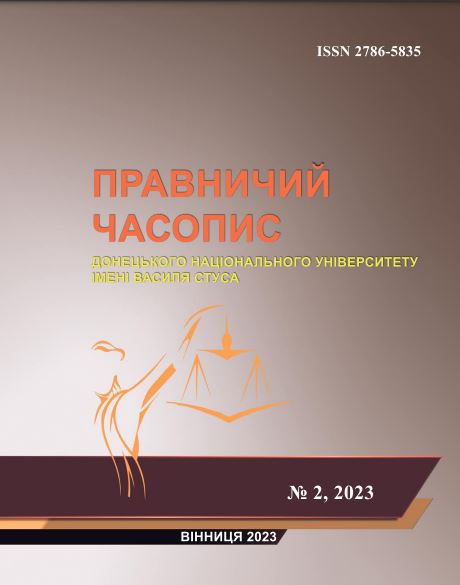Problems of Implementing Freedom of Speech in the Context of Armed Aggression
DOI:
https://doi.org/10.31558/2786-5835.2023.2.6Keywords:
freedom; freedom of speech; human rights; aggression; armed conflict; guarantees of the implementation of law; rule of law; principles of law; protection of human rights; information security; ECHRAbstract
The purpose of the scientific article is to analyze the problems of implementing freedom of speech in the context of armed aggression, as well as attempts to solve them.
The article states that the existence of freedom of speech or, in other words, the right of free expression is a fundamental feature of democracy. First of all, in order to maintain the possibility of its implementation, it must necessarily be enshrined in the regulatory legal acts of the country claiming to be democratic. Such legal consolidation acts both as a guarantee of democracy and as a way to regulate the limits of this freedom, taking into account the protection of the rights of other people and national values. Freedom of expression laws may establish obligations and responsibilities associated with this freedom. This may include restrictions on appealing to violence, defamation, spreading disinformation, or other actions that may harm other citizens or society as a whole.
It is revealed that the implementation of freedom of speech in relation to the preservation and observance of national interests is an urgent issue. One of the essential and necessary factors for the viability of democracy is the presence of a strong and independent press and the guarantee of everyone’s right to freedom of expression. Based on the assumption of absolute freedom of speech, the state will certainly face a number of problems, the key of which are disinformation and propaganda, which will have a severely negative impact on national security and public sentiment.
It is argued that the exercise of freedom of speech and its protection in the face of armed aggression is extremely difficult, given the tension of both citizens and state authorities. Even in peacetime, freedom of speech may be restricted in some cases, for example to protect national security or public order, and in armed conflicts freedom of speech may be restricted even further, as states may strengthen control over information to protect themselves from hostile propaganda or disinformation. It is the definition of the limits of freedom of speech that is problematic for the solution, given the complexity of the country’s political situation.
In situations of armed conflict, authoritarian regimes or political instability, international standards can serve as an additional means of protecting the rights of journalists and activists who may face reprisals from national authorities.
References
Стовпець О. В. Роздуми щодо свободи слова у контексті феноменів «нової етики» та «канселінгу». Соціально-гуманітарні виміри правової держави: матеріали Всеукр. наук.- практ. конф. (30 квітня 2021 р.). Дніпро: ДДУВС, 2021. С. 260–266.
Гуйван П. Про свободу слова як елемент правового статусу людини у демократичному суспільстві: міжнародний підхід. Актуальні питання розвитку юридичної науки в умовах COVID-19: матеріали Всеукр. науково-практ. конф., м. Рівне, 10–11 груд. 2020 р. Рівне, 2020. С. 95–99.
Конвенція про захист прав людини і основоположних свобод: Конвенція Ради Європи від 04.11.1950 р.: станом на 1 серп. 2021 р. URL: https://zakon.rada.gov.ua/laws/show/995_ 004#Text
Ярмол Л. В. Свобода вираження поглядів та проблеми юридичного забезпечення її реалізації в Україні (загальнотеоретичне дослідження): дис. … д-ра юрид. наук. Львів, 2018. 494 с.
Черниш Р., Осічнюк Л. Національні інтереси держави та можливість обмеження права на свободу слова: питання співвідношення. Problems of legality. 2021. № 4. С. 166–181.
Барнич К. І. Реалізація права на свободу вираження. Наукові праці Національного університету «Одеська юридична академія». 2019. Т. 25. С. 19–25.
Конституція України: від 28.06.1996 р. № 254к/96-ВР. Відомості Верховної Ради України. 1996. № 30. Ст. 141.
Про медіа: Закон України від 13.12.2022 р. № 2849-IX. Голос України. 2022. № 267. С. 279.
Загальна декларація прав людини: від 10.12.1948 р. URL: https://zakon.rada.gov.ua/laws/ show/995_015#Text
Бурмагін О., Опришко Л., Опришко Д. Свобода слова в умовах збройного конфлікту. Київ: ГО «Платформа прав людини», 2019. 112 с.
Стрекалов А. Є. Обмеження основних прав та свобод людини і громадянина як інститут конституційного права України: автореф. дис. … канд. юрид. наук: 12.00.02. Харків, 2010. 20 с.

